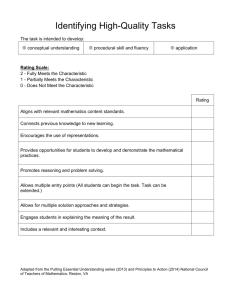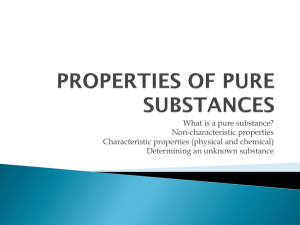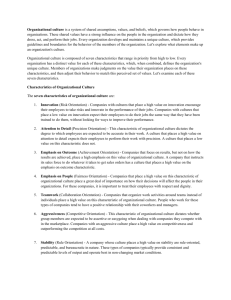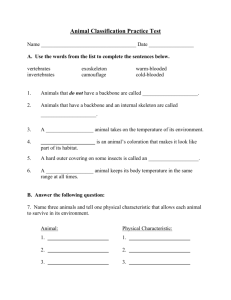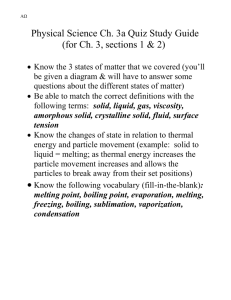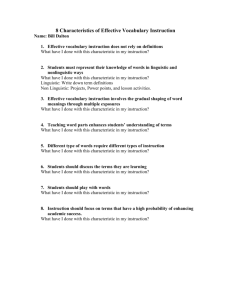Physical Properties & Characteristic Properties vs Non
advertisement
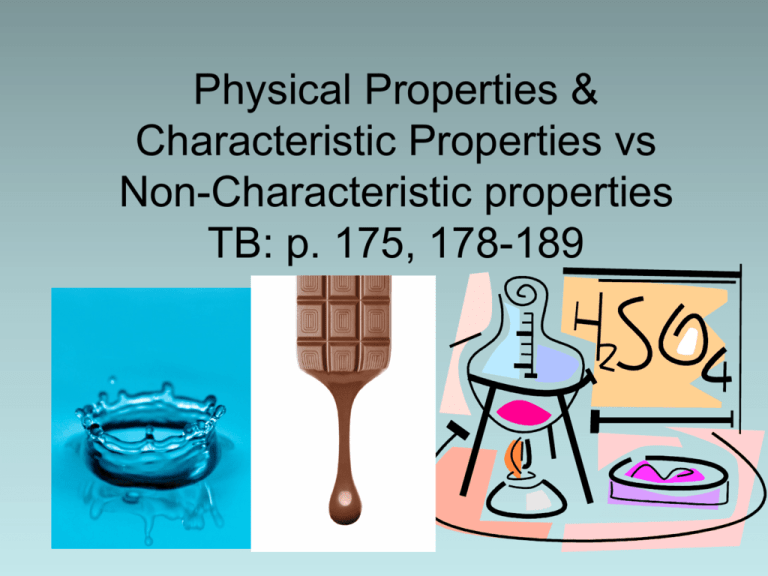
Physical Properties & Characteristic Properties vs Non-Characteristic properties TB: p. 175, 178-189 Physical Properties • These can be observed or measured without changing the make-up of the matter of the object • These properties can be used to describe the object • Two categories: non-characteristic and characteristic properties Physical Properties Include: • • • • Appearance Texture Color Odor • • • • Melting Point Boiling Point Density Solubility Non-Characteristic Properties A non-characteristic property is a physical or chemical property that is not unique to one particular substance. Basically: A NCP can be used to describe many substances Non-Characteristic Properties Examples • • • • • • Temperature, Mass, Shape, Colour, Volume, & Acidity and alkalinity (pH) Temperature • In science, temperature is measured in degrees Celsius (ºC) or sometimes in Kelvin (K) • To measure temperature we use a thermometer Mass Shape and Color Volume Acidity and Alkalinity Characteristic Properties A characteristic property is a physical or chemical property that is unique to a particular substance. Basically: A CP can be used to identify a substance. Characteristic Properties Examples Density: The amount of matter in an object, which is calculated by dividing the mass by the volume Magnetism: The force of attraction between a magnet and a magnetic object Characteristic Properties Examples (cont.) Solubility: A measure of how well a substance can dissolve in another substance. – The Solute: the substance that is dissolved – The Solvent: the substance that the solute dissolves – The Solution: the result of mixing a solute and a solvent Characteristic Properties Examples (cont.) Melting Point: The temperature at which a substance changes from a solid to a liquid Boiling Point: The temperature at which a substance changes from a liquid to a gas Examples • Freezing point of Water: 0ºC – Liquid water will freeze to solid ice at 0ºC • Melting Point of Ice: 0ºC – Solid ice will melt to liquid water at 0ºC • Boiling Point of Ice: 100ºC – Liquid water will change into a gas at 100ºC Example: The English Oak Characteristic Property • Density = 720 kg/m3 Non-Characteristic Property • Light yellow to Medium brown in colour Non-Characteristic Property • 25-30 m tall Below is the properties of unknown substances. Which of the following is a characteristic property? 1. Mass of 346 grams 2. Red and circular in shape 3. Temperature of 250C 4. Boiling Point of 204oC Identify all of the noncharactertistic properties listed below 1. Volume of 200 ml 2. Square shaped 3. Temperature of 450C 4. Freezing Point of 204oC 5. Density of 24 g/ml Exam like question!!! Julie has a unknown substance in a beaker. Its properties are described in the chart to the right. Using the substance chart below, identify which substance Julie has in the beaker. Iron Density 7.86 g/ml Mass 103.5 g Color yellow Magnetic No Volume 50 ml Color Magnetic Yellow-Grey Yes Water 1 g/ml Colorless Nitroge 0.00125 g/ml Yellow n Sulphur 2.07 g/ml Yellow No No No Remember! Characteristic Properties CO2 - Turns limewater cloudy O2 - Ignites glowing splint H2 - Pops in presence of flame Density, DENSITY = m/V Melting Point Freezing Point Boiling Point Non-Characteristic Properties - Color - Shape - Texture - Size - Mass - Temperature - Odor - Weight - Volume

